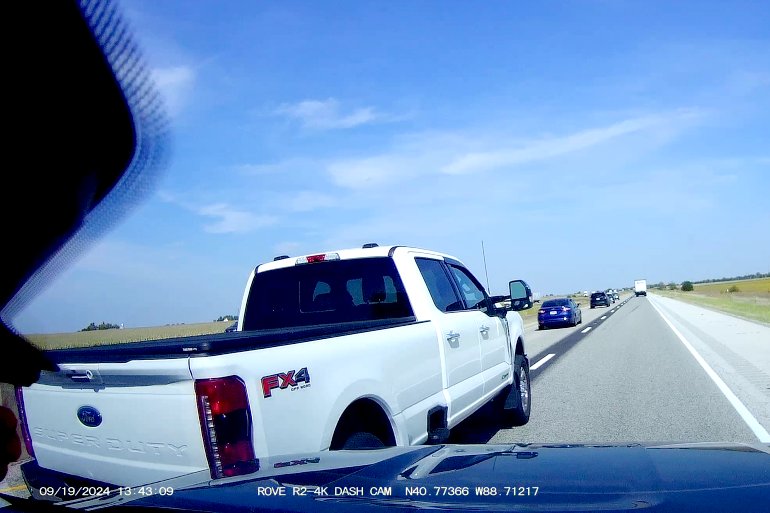We carry a gun so we’re harder to kill, and know the law of self-defense so we’re harder to convict. As much as we try to avoid crime, sometimes life gives us a crap sandwich. Even if you use your gun or other means of force to resist attack, injuries happen.
Anyone can see the physical injuries caused from a violent attack, but sometimes there is mental trauma as well. While those mental issues aren’t easily discerned by a casual observer, they can pose serious problems for the afflicted. Sometimes, even normally big, strong men (and women) can benefit from professional help to heal those mental injuries to help restore peace of mind.
On September 19, I found myself in that unenviable spot, subject of a hot-tempered driver’s road rage. He had a passenger who was also fired up, and I suspected they were feeding off one another’s anger. Instead of driving on, the driver decided to use a brand new F-350 pickup towing a trailer (probably a car hauler) to force me off Interstate 55 near Pontiac, Illinois.
He came into my lane and at first I gave him lots of room. Slowing aggressively wasn’t really an option with a big truck behind me. Then when he kept coming, the little voice in the back of my head started warning me: “He may not stop until you’re off the road!”
And he kept coming.
The little voice in the back of my head changed to. “people die in ditches.” Instead of driving off the shoulder, I opted to stand my ground. At that point we collided. His brand new F-350 and nice trailer were no longer pristine. Lord knows my pride and joy Explorer took plenty of abuse as well – about $8,500 worth in fact.
I had 911 on the phone to report a road rage attack and collision even before pulling onto the side of the road. Maybe 10 minutes later the state trooper arrived, took statements from both sides and then he returned to my car. I asked him what he thought. He chuckled.
“As you might imagine, their statement is about the dead opposite of yours. They said you were the one suffering from road rage and you swerved into them in the passing lane out of anger,” he told me.
“Ah, but I have some dashcam footage,” I told him. “But I’m struggling to bring it up.”
“Well,” he sighed. “It’s not looking so good for you right now. If you can show me that footage, that would be very helpful.”
A few minutes later, I took the memory card and adapter back to his squad and we watched the video together. It wasn’t exactly as I remembered it. I had the gist correct. And it clearly showed the statements of the guys in the truck to be misleading or downright false.
But there were two big takeaways from watching the video. The distances weren’t exactly as I remembered them. And the whole incident took place in a little over two seconds in real time. It seemed like it took a lot longer – like 10 seconds or more as my mind remembered it. Both of these – distorted perceptions of distance and time – were psychological effects of a high-stress incident that I’d learned about in courses on deadly force. Now I’d lived them first-hand.
The lawman copied the footage to his laptop and said he wanted to review it with his supervisor before making a decision on tickets.
The Waiting and Worrying Game
With the left side of my car banged up, including holes in the body, I finished the day with some wind noise, sans a mirror or a doorhandle that worked properly. What’s more, I also drove away with a lot of loose ends. Would I get the tickets or potentially get arrested? Then there were worries about fixing the car.
My anxiety continued steadily growing throughout the day into the evening. My lovely bride was angry that she had to leave work to pick up the kids. She offered zero support. To the contrary, she was critical of my decision-making from start to finish.
“You should have left the roadway to avoid the collision, or stopped,” she said. Leave the roadway? From my time as a fire department photographer many years ago, I saw more than a few single-vehicle fatal crashes where people left the roadway. Not only that, but the speed limit back then was 55. As for getting rear ended? That didn’t seem appealing to me either. Thanks for the second guessing, honey. That planted seeds of doubt in my mind.
It infuriated her when I said I was comfortable with how I handled it. It turned into something approaching an argument, and she shouted that I needed to get professional help. Another day in the life of marital bliss.
The next morning, I was angry – very angry – that another driver would try to run me off the road while having a road rage fit cruising down the Interstate at 70+ mph. They could have killed me trying to bully me like a schoolyard thug. My mind raced and emotionally I felt…unstable. One moment I was angry. Another moment I almost felt euphoric that I survived physically unscathed. Physically, I felt hot flashes, dry mouth and lots of tension to the point of nausea recalling what happened. Then thoughts would turn to anger at my wife for her utter and total criticism. Add in a big bucket of worries about how badly this could go wrong – arrest, conviction, loss of my job and the right to own firearms. I broke down sobbing in the locker room at the gym.
I knew I needed to get some help before I let this eat me up from the inside. At the same time I didn’t want to just randomly approach a therapist. The last thing I needed was to get a gun-hating liberal kook therapist to tell me I should submit next time.
Getting Help
So I reached out to the local sheriff and the assistant chief at the local PD. I texted them both asking who their department’s go-to therapist was for crime victims or cops who have used deadly force. In a couple minutes, they both came back with the same person, Emily Barker, a nurse practitioner who specializes in PTSD and trauma, based in Normal, Illinois.
I called her immediately and left a sobbing voicemail. She got back to me in a couple of hours. She offered time over the weekend if I felt I needed it, but I knew I’d be around friends at a class so I opted for a 4-hour evening session Monday night. It wasn’t cheap at $200 an hour, but she came highly recommended by men I highly respect. I sent her the dashcam footage and a narrative so she could see what happened for herself ahead of the appointment.
It marked the first time I’d ever reached out for “therapy.” I’d always had kind of a dismissive view of therapists and their work “helping” people. And who can forget the commercial where R. Lee Ermey plays the therapist?
But when two LEO administrators sing high praise for the same person, I figured I didn’t have anything to lose except my freedom were I to over-react to an incident in my then-emotionally unstable and rattled state. Or my sanity as doubts and PTSD ate me up on the inside.
I walked into the appointment tense and unsure about things. We talked about the incident in great detail, eliciting some strong feelings of anxiety, anger, uncertainty and all the physical symptoms as well. I shared some of the bullying I’d experienced as a youngster. (I wrote about some of it at TTAG years ago.) She had me practice some treatment techniques including alternating movements while recalling (and re-living) the incident in vivid detail, and as I did so the anxiety tension began to fade. Over and over, she practiced her black magic. Four hours later I felt mentally exhausted and utterly spent.
Before I left, she warned me to avoid any intoxicants.
“Just go to bed when you get home,” she said. “You’ll be emotionally raw for a few days as you heal.” Indeed, I felt just as she warned me.
While that first session did wonders, I still felt all those emotions rushing back when I gave my statement to the insurance company. And again when the other party’s insurance initially refused to accept any financial responsibility for the crash.
In the next couple days, I learned that the other driver was cited and the insurer of the truck accepted fault after getting a copy of the dash cam footage. Both the ISP and State Farm cleared me of any wrong doing and State Farm’s claim investigator said they would stand behind me all day long on this incident. The dashcam proved priceless for me.
A few more therapy sessions filed off the remaining burrs causing me anxiety and emotional distress. Writing about this a couple of weeks after my final session I barely feel any anxiety at all.
The true test will come when I take the driver to small claims court to recover the last $3000 in car rental expenses. I’m actually kind of looking forward to my day in court with him.
If I could leave our TTAG intelligentsia with anything: don’t be afraid to seek out therapy if you’re the victim of an attack. Your gun might save you during an attack, but it won’t help you fix mental trauma from an attack.
Seek out help, especially if you recognize that you have mental wounds. You’re not weak for reaching out for help, and they’re not going to take your guns away unless you’re talking about self-harm, and even then losing your guns isn’t a foregone conclusion. Heck, even if you don’t sense something wrong it still might be well worth a couple of hours to speak with a therapist.
Your family will likely thank you for it down the road.
Lastly, if you drive like a decent human being, put a dashcam in your car. Like yesterday.
Read the full article here





